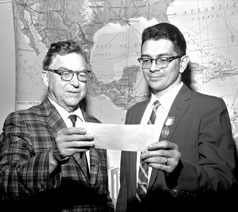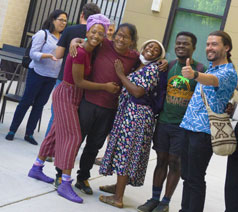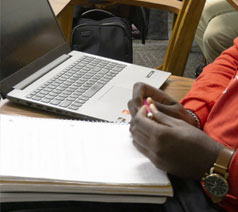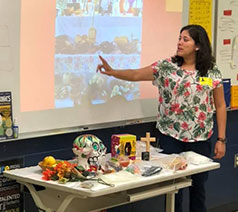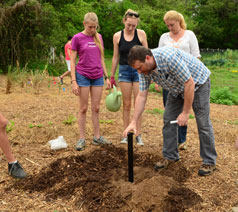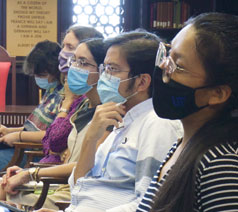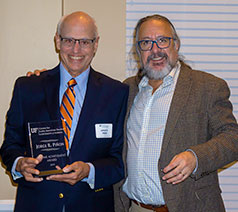Internationalizing the Curriculum: The Many Faces of Democracy
Event Start Date: September 30, 2023 9:00 AM
Event End Date: September 30, 2023 2:00 PM
.
Internationalizing the Curriculum: The Many Faces of Democracy
September 30, 2023, 9:00 am - 2:00 pm
UF Reitz Student Union Rm G325 // Virtual
Join the University of Florida Center for European Studies, Center for Latin American Studies, and Center for African Studies, and the University of Texas at Austin Hemispheres National Resource Centers for current research presentations on The Many Faces of Democracy. Area studies experts will represent what democracy looks like in Western Europe, Latin America, Africa, and Russia/Eastern Europe/Eurasia. This free workshop is an opportunity to network with scholars in your fields, such as Political Science, History, and Anthropology. For more information and to register in-person check out https://ces.ufl.edu/event/the-many-faces-of-democracy-fall-workshop/ or virtually at https://ufl.zoom.us/meeting/register/tJMrcuCoqT4uHdUIuc3s7F5Lc-Fos3WSlUCD#/registration
Need assistance with travel? Please contact Carla Ruffer at rufferc@ufl.edu.
Internationalizing the Curriculum: The Many Faces of Democracy
Saturday, September 30, 2023
The University of Florida, Reitz Student Union Room G325 & virtually here
9:00-9:30 am – Check-in, continental breakfast provided
9:30-10:15 am – The Use and Abuse of ‘Democracy’ in North Macedonia.
Vasiliki Neofotistos, University of Buffalo, SUNY – Department of Anthropology
In this presentation, Dr. Neofotistos explores the different meanings with which various social groups and actors in the country now officially known as North Macedonia have imbued the word since the country’s independence in 1991. Examples include Albanian insurgents, fugitive former Prime Minister Nikola Gruevski, members of an NGO who traveled to the Hunza Valley in northern Pakistan to establish links with ancient Macedonians, and members of so-called Macedonian patriotic associations. Special attention will be given both to the strategic deployment of the term for different ends and to heated contestations over its meanings within the larger context of regional power struggles. Dr. Neofotistos uses the case study of North Macedonia to describe some of the contributions anthropologists make to the study of democracy.
10:15-11:00 am – Three Decades of Democracy in Africa: Successes, Failures, and Emerging Trends
Richard Kweitsu, University of Florida – Department of Political Science
This presentation examines the varied experiences of democratic governance in Africa over the last thirty years. While most African countries have conducted some form of elections since the 1990s and many have adopted constitutions, adherence to these constitutions has not always been consistent. Although the frequency of elections has increased, the quality of the electoral process has deteriorated over time. Additionally, an emerging trend in recent years is the circumvention of constitutional term limits by African leaders, and the judicialization of presidential and parliamentary elections. The presentation will explore these diverging trends of democratization in Africa.
11:00-11:15 am – break
11:15 am-12:00 pm – When Democracies Fail: The Rise and Fall of Spain’s Second Republic, 1931-1936
George Esenwein, University of Florida – Department of History
Today political pundits are focused on the various ways in which democratic values and beliefs are being eroded by the rising tide of anti-liberal forces in Europe and the United States. History tells us that this “dialectical struggle” is not new. For example, during the interwar era (1919-1939) the number of fascist, authoritarian, and communist dictatorships eventually outnumbered governments that were regarded as liberal democratic. Spain represented an exception to this pattern by establishing a liberal regime, the Second Republic (1931-1936), which ultimately succumbed to political, cultural, and economic trends that were antithetical to democratic rule. My talk sheds light on two aspects relating to Spain’s ill-fated attempt to establish a republic in the 1930s. The first is concerned with an explanation as to why Spanish politicians decided to opt for democracy at a time when the rest of Europe seemed to move in a different political direction. The second addresses the question as to why Spain’s democratic regime was not only short-lived but was superseded by a bloody civil war that lasted nearly three years.
12:00-12:45 pm – lunch provided / networking
12:45-1:30 pm – Dueling Dynamics: Democracy and Democratic Backsliding in Latin America
William Nylen, Stetson University
This talk looks at the state of democracy in Latin America, focusing particularly on Brazil.
1:30 -2:00 pm – Closing

